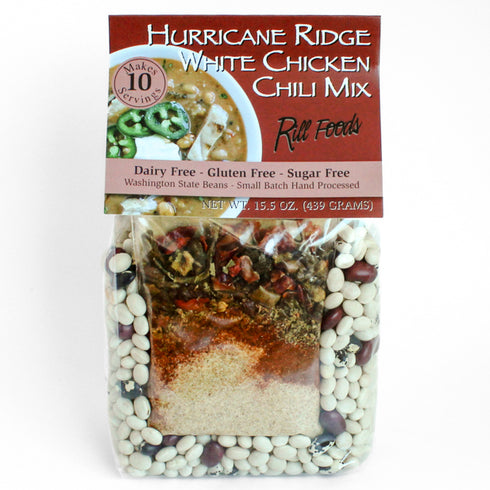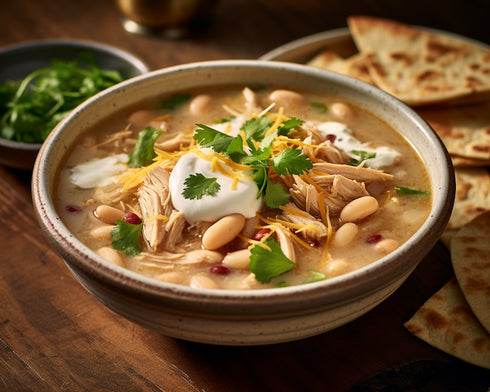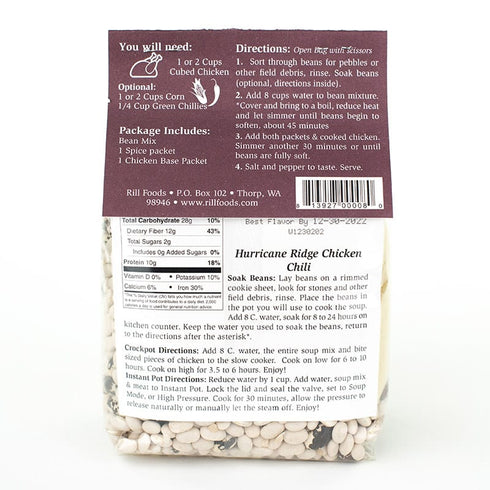Cooking Time
50 minutes
Serving Size
10 cups
Kettle Size
4 quarts
Ingredients
Brewer's lentils, dehydrated potatoes, red chief lentils, dehydrated celery, dehydrated carrots, dehydrated bell peppers, herbs and spices.
 Product of Washington State
Product of Washington State

Rill's Specialty Soups are a Product of Washington State.
You will need:
1 or 2 cups Fresh or Canned Chicken cubed
1 or 2 cups canned or frozen corn (optional)
1/4 cup green chili’s (optional)
Directions: In 3 quart saucepan add 7 cups water and soak over night or 6 to 8 hours. Drain water and replace with 6 cups fresh water. Bring to a boil and reduce to simmer for approximately 1 hour until beans begin to soften. Add spice packet, chicken base packet and your choice of chicken and any other options desired. Simmer another 30 minutes or until beans are completely soft. Salt and pepper to taste. Serve. Optional, top with grated cheese or sour cream.
Ingredients: Small white beans, orca beans, soldier beans, Jacob cattle beans, dehydrated bell pepper, herbs and spices, dehydrated jalapeños, and chicken base. Chicken Base: alt, corn syrup solids, corn starch, hydrolyzed soy protein (partially hydrogenated cotton seed and/or soybean oils added), chicken fat (natural flavor), sugar, silicon dioxide (ant-icaking gent), artificial flavor, dehydrated onion, turmeric and other spices, disodium inosinate and disodium quanylate (flavor enhancers), NO MSG, CONTAINS SOY.
Tidbits of History
Lemolo (le•mo•lo) Chinook Jargon word meaning wild or untamed.
After the Lewis and Clark expedition explored the Pacific Northwest, trappers started to rapidly relocate west in search of precious pelts. Many of the trappers made friends with the natives and traded knives, pots, and other simple luxuries for the precious furs that the trappers desired. To communicate the trappers and the natives created their own pidgin, a grammatically simplified form of a language; they created what we now know as Chinook Jargon. Lemolo originates from the French word “le marron”, which means runaway slave. Since the natives could not pronounce the letter “r” a new word was formed, “Lemolo”.
Even though France never occupied the Pacific Northwest, and there were only two French ships that ever visited its shores, French is the most prominent non-native language to have influenced Chinook Jargon. The reason behind this strange occurrence hinges on the Métis people. The Métis people are a group of half Native Americans and half Europeans that formed in Canada as the result of traders who married Native women. The French owned the North West Company encouraged men to marry natives, whereas English
companies discouraged it, therefore most of the Métis people are of French descent. Later the Métis became the main trappers in the Northwest because they could speak both European and Native American languages as well as easily cross cultural lines.
Today many jargon words have made their way into our everyday speech. Some words that are from Jargon are hooch, potluck and saltchuck; Chinook Jargon left even more of a legacy in its geographical names. Across Oregon, Washington and British Columbia there are hundreds of towns, rivers, mountains and highways with names that originate from Chinook Jargon including Tumwater, Skookum, Muckamuck and Lemolo. Many places in Washington and Oregon have adopted this name as their own including a small community in Liberty Bay Washington where the Suquamish Indians lived almost 15,000 years ago, and a pristine lake resort in Southwest Oregon’s Umpqua National Forest.
Cooking Variations:
Substitute ground pork or ground turkey in place of chicken. Reduce sodium by limiting the amount of chicken base (yellow packet) used.
Vegetarian:
Leave out yellow packet of chicken base, add 15-oz. vegetable broth and reduce water by two cups. If desired add meat substitute.
Bean Hints & Nutrition:
Beans should always be sorted, cleaned and washed to remove any small rocks, etc.
The USDA recommends that adults eat three cups of beans per week for the maximum health benefit. Beans are naturally low in total fat, contain no saturated at or cholesterol and are an excellent source of protein, calcium, iron, folic acid, and potassium.
Why Beans May Cause Discomfort:
Beans are high in fiber and complex sugars that our bodies have to work hard to digest which may cause intestinal gas.
To reduce cooking time and intestinal gas soak the beans six to 12 hours ahead of cooking to help dissolve the complex sugars. Drain and replace the soaking water as frequently as possible. Over time increase the amount of beans you eat to help your body adapt.
Free Shipping -
All orders of $50 or more qualify for free shipping excluding Traxxas RC vehicles. RC vehicles ship for $9.99 - $12.99 each (in-state vs. out of state).
Free Local Delivery -
Within Kittitas County (M-F)
Returns & 100% Money Back Guarantee -
If within the first 15 days after receiving your order you would like to return your item(s) for any reason, call 509-925-9851 or email Order@Jerrols.com and we will email you a return label to print and use to ship back to us via USPS.










